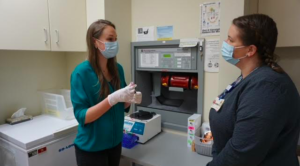[Cookeville, TN] — A big part of treating cancer is knowing what it is.
One proactive way of doing that is through genetic testing, which is one of the many services offered at Cookeville Regional Medical Center and the only one in the region.
“Genetic testing has come a long way not only in testing but affordability,” said Ashley Cohen, CRMC’s licensed, certified genetic counselor.
People may be more familiar with the BRCA 1 and 2 genetic mutations, but there is a lot more that genetic testing can pick up.
“These two genes account for the majority of hereditary breast and ovarian cancers in women, but there are also other genes that are associated with these cancers,” she said. “Colon, pancreatic, prostate, stomach, kidney and more rare cancers can also be associated with different hereditary causes.”
Genetic counseling and testing can be empowering, providing patients the opportunity to be proactive with their health and/or the health of their family members.
As a genetic counselor, Cohen provides education on genetic testing options, as well as discusses the implications, benefits and limitations of genetic testing for the patient and their family members.
“All it takes is a blood sample or a saliva sample,” Cohen said. “You can get it done anytime and possibly know ahead of time what the risk is and reduce that risk.”
Results come back around three weeks later.
Knowing what mutation it is can also help in identifying the best treatment options.
“I remember one patient I worked with who had colon cancer,” she said. “There were genetic tests done on the tumor and it detected a BRCA mutation, and with that knowledge, he had his two daughters tested. One tested positive for the BRCA gene, the other tested negative. The one who tested positive had opted to get her ovaries removed and with that they found she was in early stages of ovarian cancer.”
Genetic testing can also help those who do not know their true family history, as that person might have been adopted as a child.
“Genetic testing gives them control,” she said. “It helps patients make empowered decisions about their healthcare and share that information with their family.”
It has also come a long way in affordability. Insurance companies typically cover it; however, genetic testing is less than $100 if not covered by insurance.
Who should consider having a genetics test?
Anyone who has a personal or family history of cancer diagnosed at younger than 50
years of age
Same type of cancer in multiple relatives on the same side of the family
Strong family history of multiple types of cancer
Personal history of greater than 10 colon polyps
Personal or family history of rare cancers (ovarian, stomach, pancreatic, kidney cancers,
etc.)
Personal or family history of a genetic mutation already detected by prior genetic
testing.
“This is one of many tools in the large tool box that Cookeville Regional Medical Center has available to diagnose and treat cancer,” said Paul Korth, CRMC CEO. “Genetic testing has many benefits and we’re proud to offer it here.”
Patients should speak with their physician about a referral to a genetic counselor for a complete assessment.
Cohen can be reached by calling 931-783-2476 or by emailing amcohen@crmchealth.org.
PHOTO: Ashley Cohen, MS, CGC, speaks with Victoria Dunson, medical lab technician, about the benefits of genetic testing.
Find CRMC on social media or visit crmchealth.org.
Cookeville Regional Medical Center is celebrating 100 years in 2021. It began as a 15-bed private clinic built by a local surgeon and has grown to a 269 bed Regional Center on a 55-acre campus featuring state-of-the-art Cardiac care, Orthopedic care, Cancer Center, Robotic surgery and much more.

